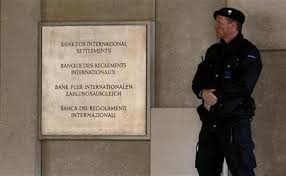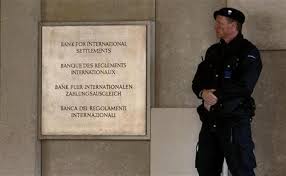
Warning of a “gathering storm” which has long been brewing, the Bank of International Settlements has said that a fragile calm in global financial markets has given way to all-out turbulence.
Investors were concerned governments around the world were running out of policy options, warned the BIS in its latest quarterly report, watched closely by investors. The BIS is known as the central bank of central banks.
The “uneasy calm” of previous months had given way to turbulence and a “gathering storm”, said BIS chief Claudio Borio.
“The tension between the markets’ tranquility and the underlying economic vulnerabilities had to be resolved at some point. In the recent quarter, we may have been witnessing the beginning of its resolution,” he added.
“We may not be seeing isolated bolts from the blue, but the signs of a gathering storm that has been building for a long time,” he warned.
The BIS report said that investors were concerned about what central banks could do in the event of another crisis even as the Asian markets enjoyed another broadly positive day on Monday and continued to claw back the losses of January.
“Underlying some of the turbulence was market participants’ growing concern over the dwindling options for policy support in the face of the weakening growth outlook,” the report said.
“With fiscal space tight and structural policies largely dormant, central bank measures were seen to be approaching their limits,” the report added.
From the first post-crisis interest rate hike by the US Federal Reserve in December, to accumulating signs of China Slowdown, Borio surveyed the major disruptions over the last three months.
Markets were plagued by fears about the health of global banks and the Bank of Japan’s shock decision to impose negative policy rates, Borio said in what he termed the second phase of turbulence in the last quarter.
He added the turbulence was driven by the persistently weak oil prices throughout the quarter.
Borio said “debt is what helps us understand apparently unrelated developments” while seeking to find a common threat for the various global trends at play.
“Against the backdrop of a long-term, crisis-exacerbated decline in productivity growth, the stock of global debt has continued to rise and the room for policy manoeuvre has continued to narrow,” he said.
While private sector debt rises have been concentrated in emerging markets, Borio added that public sector debt has risen broadly.
As “highly indebted oil-producing firms come under pressure to keep the spigots open to meet their service burdens”, the BIS chief argued that debt also offered a “hint” on the continuing weakness of oil prices.
(Source:www.theguardian.com)
Investors were concerned governments around the world were running out of policy options, warned the BIS in its latest quarterly report, watched closely by investors. The BIS is known as the central bank of central banks.
The “uneasy calm” of previous months had given way to turbulence and a “gathering storm”, said BIS chief Claudio Borio.
“The tension between the markets’ tranquility and the underlying economic vulnerabilities had to be resolved at some point. In the recent quarter, we may have been witnessing the beginning of its resolution,” he added.
“We may not be seeing isolated bolts from the blue, but the signs of a gathering storm that has been building for a long time,” he warned.
The BIS report said that investors were concerned about what central banks could do in the event of another crisis even as the Asian markets enjoyed another broadly positive day on Monday and continued to claw back the losses of January.
“Underlying some of the turbulence was market participants’ growing concern over the dwindling options for policy support in the face of the weakening growth outlook,” the report said.
“With fiscal space tight and structural policies largely dormant, central bank measures were seen to be approaching their limits,” the report added.
From the first post-crisis interest rate hike by the US Federal Reserve in December, to accumulating signs of China Slowdown, Borio surveyed the major disruptions over the last three months.
Markets were plagued by fears about the health of global banks and the Bank of Japan’s shock decision to impose negative policy rates, Borio said in what he termed the second phase of turbulence in the last quarter.
He added the turbulence was driven by the persistently weak oil prices throughout the quarter.
Borio said “debt is what helps us understand apparently unrelated developments” while seeking to find a common threat for the various global trends at play.
“Against the backdrop of a long-term, crisis-exacerbated decline in productivity growth, the stock of global debt has continued to rise and the room for policy manoeuvre has continued to narrow,” he said.
While private sector debt rises have been concentrated in emerging markets, Borio added that public sector debt has risen broadly.
As “highly indebted oil-producing firms come under pressure to keep the spigots open to meet their service burdens”, the BIS chief argued that debt also offered a “hint” on the continuing weakness of oil prices.
(Source:www.theguardian.com)





